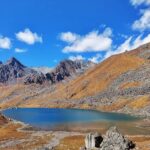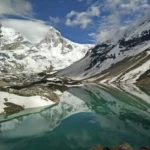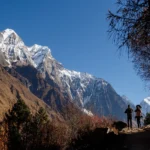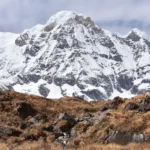Anagha Parate, a trained medical professional, finds solace in the secluded mountain trails. For Akansha Siwach, the unexplored trail in the remote parts of the North East satiates her yearning to be a free spirit. Neha Rai, a young climber, just scaled the mighty Mt Kilimanjaro in Africa and hopes more women follow her to explore the diversified outdoors. Arushi, a trek leader and Outdoor enthusiast, quit her MBA dreams and now leads a content life amidst nature, facilitating diverse outdoor programs.
A few years ago, men dominated the hiking and trekking industries. The wilderness, in the mountains or deep inside dense forests, was accessible only to a few daring women who wanted to explore the rawness of the outdoor world. However, in recent years, we have observed a shift as more and more women venture into the wild, exploring the ruggedness of the outdoor world. As an outdoor company, we have witnessed this change and anticipate that more women will come forward and explore themselves in the outdoors.
To celebrate women in the outdoors, we interacted with four incredible women who have been exploring the Indian outdoors. Their love for the outdoors and nature has inspired them to take initiative, lead organisations, and create a community of people who find solace in the wilderness.
We hope the stories of these incredible women in outdoors inspire you all, especially the women, to go out there and explore yourself, irrespective of your idea and definition of the outdoors.
Anagha Parate
Program Manager/Outdoor Leader – gooutwithowls.com
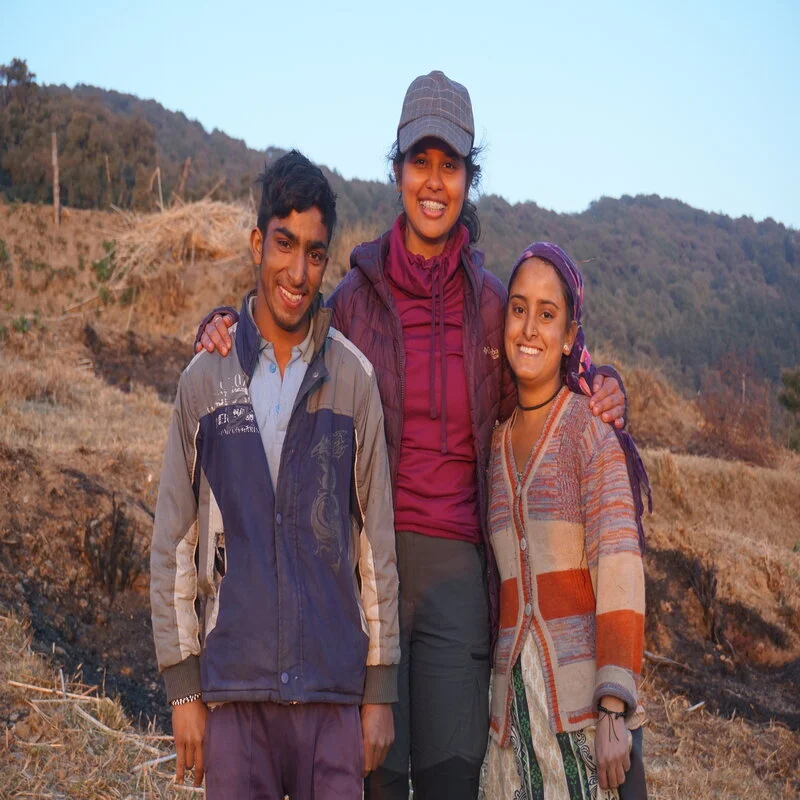
Anagha Parate, a doctor by profession, frequents the Himalayas more than the hospital. She discovered her love for nature during her first trek in Himachal Pradesh.
“I was in my last year of MBBS and was interning in a hospital. I was trying to carve my niche in the medical field. However, I was unambitious toward these postings as a medical intern. I had a eureka moment during my first trek to Buran Ghati in Himachal Pradesh. Being close to nature, in the wilderness, made me realise where I truly yearn to belong”, shares Anagha. “Exploring the trails high in the mountains was an eye-opener for me. It made me realize that this is what I want to explore more”, she recalls.
Anagha is currently associated as a Program Manager with OWLs and an outdoor adventure company. She joined the company in December 2021 as a Medical Officer. “Although I joined as a medical officer, I was handling different roles, which gave me in-depth insights into the functioning of an Outdoor organization.
She enrolled on Mountaineering and Outdoor Learning courses when she realized her love for the outdoors. During her Outdoor Leadership Course in Mussoorie, she recognized her interest in Experiential Learning and joined OWLS, an Outdoor Experiential Learning organization.
But switching careers while embracing her love for the outdoors was an uphill battle. “It shocked my parents when I revealed to them about exploring a career in the outdoors. There was resistance from them initially, which is obvious. In an Indian family, where a daughter, a trained doctor reveals such a drastic career change, it will appall them. However, when I told them about how being in the outdoors helps me to be the best and complete version of myself, they have withheld their dissatisfaction to a certain level, she adds.
Before joining the outdoors wholeheartedly, Anagha worked at a Pediatric Cancer Institute in Mumbai. As she was determined to explore a career in the outdoors, she joined a government hospital in Leh. Her stint as a medical officer in Leh helped her acquire hands-on experience with different illnesses and injuries common to high-altitude regions.
Anagha says she has found solace in her personal and professional life through the wilderness. She anticipates integrating her passion and learning to create awareness about the importance of more medical practitioners in the outdoors.
“I have dedicated almost seven years of my life to studying medicine. So, I do not wish to relinquish my learning as a doctor. I want to work towards integrating my learnings as a doctor and an outdoor enthusiast. Regarding outdoor medicine practitioners, we are still far behind compared to Western society. I hope we start valuing the importance of medical professionals in the Outdoors,” shares Anagha.
As an Outdoor Leader, Anagha has led batches in India and Nepal and facilitated an Experiential Learning Programme in a remote village in West Bengal. She wishes to continue exploring the vastness of the outdoor world. She now aims to introduce the outdoors world to a larger section of society and hopes for a day when everyone discovers the need to be Outdoors to find a mental, physical, and emotional balance.
Akansha Siwach
Solo Travel Enthusiast/ Blogger at Talesofthehiddentrails
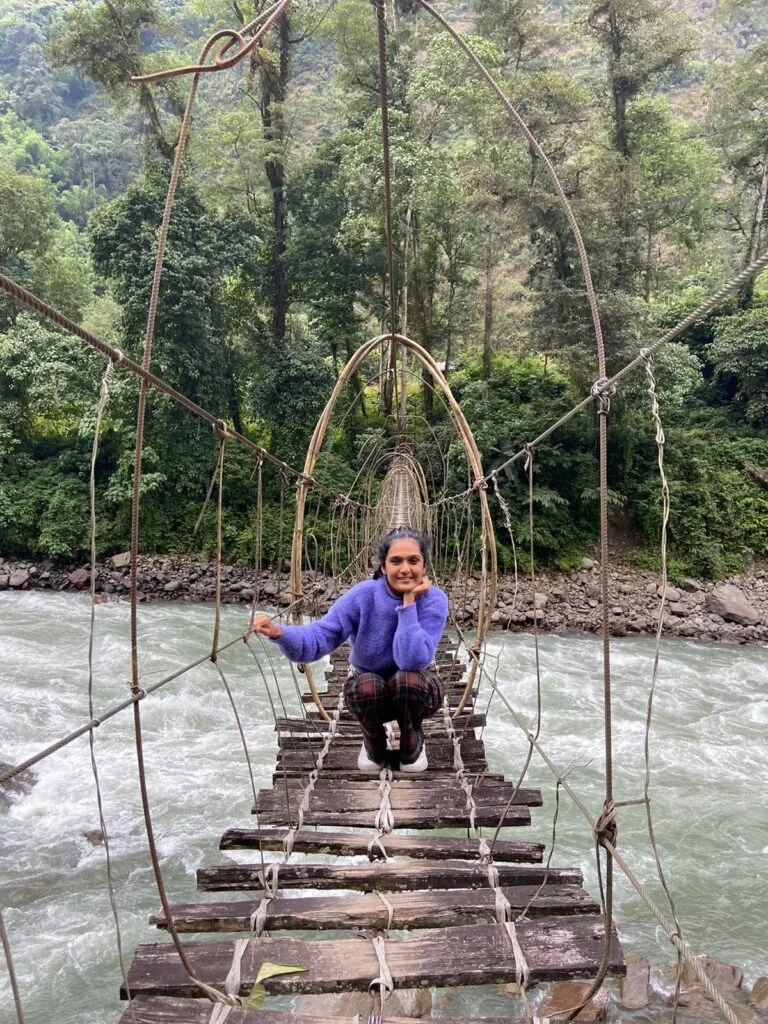
A glimpse into the social media account of Akansha Siwach will teleport you to the remote corners of the beautiful North East, especially the highlands of Arunachal Pradesh and the remote villages of Assam. Fondly called Mrs Thomas in her husband’s regiment, Akansha, an army wife, is found exploring the far-flung places in Arunachal Pradesh whenever she is not occupied with her army wife duties.
A travel and hiking enthusiast, her love for the outdoors and nature finds its roots in her early days. She owes her love for nature to her military background.
“I have always called small towns around the countryside ‘home’ owing to my defence background and hence have been close to nature. However, her true longing for nature was realized a few years ago when she moved to the land of the thunder dragon, Bhutan, with her husband in 2015.
It was during the Bhutan tenure that Akansha started exploring the outdoors.
“I was introduced to my first hike by local teachers and the senior class students while was teaching in a school in Bhutan”, shares Akansha.
She says she was captivated by the endless beauty she witnessed on the trail. “ The feeling of reaching the summit and watching the world go by below me was unexplainable,” she exclaims. There was no looking back after her first hike in Bhutan. As a solo women explorer, she has trekked extensively in Bhutan, Uttarakhand, and Himachal Pradesh, and now she has been exploring the outdoors of Northeast India.
As a solo hiker who has extensively explored the North East of India, Akansha believes the region has so much on its plate that is yet to be discovered.
“Hiking in the North East is an exclusive and surreal experience. The trails here are usually known to the guides and locals. The thick vegetation and limited trekking season also limit people. She strongly opines that one must slowly travel to this side to discover and witness the beauty of the place and its beautiful tribes.
In the last two years, Akansha has experienced life in the Buddhist nunnery with the Monpa Nuns of Tawang, camped with Mishmi tribal men at Glaw Lake in Kamlang Tiger Reserve, hiked to a mountaintop to witness the first morning light of India in Walon. A true explorer, she has been to the remotest valley that even Google map shies to talk about in Taksing, dived in turquoise pools of Khasi hills in Meghalaya, been awestruck by jaw-dropping offbeat waterfalls in Cheerapunji, befriended Axoms in a tiny village of Upper Assam and being a part of their cultural celebrations and travelled solo in the disputed territories in Nagaland. She says it’s the warmth and kindness of people in the region that amazes her and inspires her to explore more of North East.
Neha Rai
Mountaineering Instructor/ Mountaineer
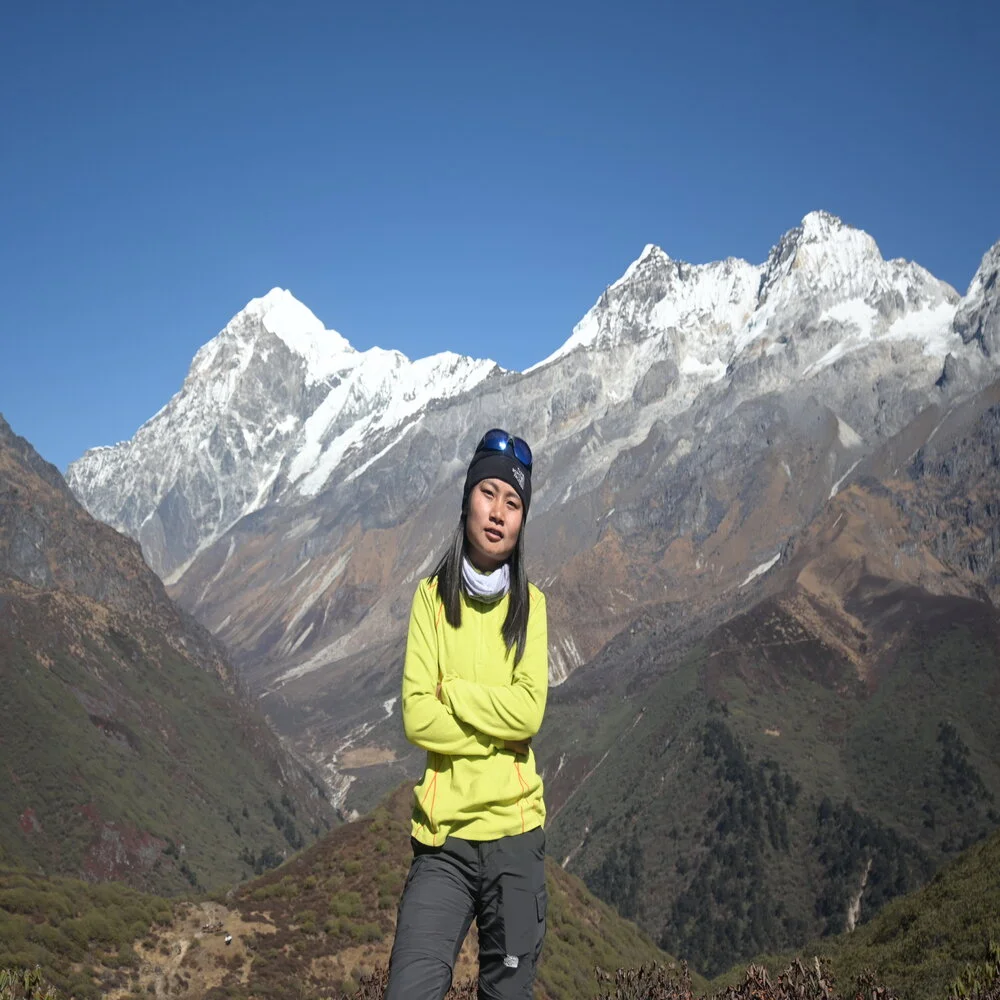
Neha Rai, a 22-year mountaineering instructor, summited her first international expedition to Africa’s highest mountain, Mount Kilimanjaro. Neha, a B.Com graduate, started navigating the outdoors as a teenager. A native of Sikkim, Neha found her true calling while exploring the forests and local trails in her hometown.
“I realized my longing to be outdoors at an early age. While initially, it started as a medium to earn a few extra bucks, I discovered that being close to nature was healing me from the inside,” shares Neha.
She says it was her explorations in the wilderness that rescued her from plunging into depression.
“I was shrouded by negativity during my college days. I would struggle to find motivation because negative thoughts had occupied my mind deeply. I felt at ease when I started venturing into the wilderness and spent more time outdoors while exploring local hikes and trails, ,” shares Neha, who has also worked as a course instructor at a prestigious Himalayan Mountaineering Institute.
She asserts that spending amidst nature helped her to find motivation and aim for a content life. “Every time I ventured into the outdoors, I would come back as a different person”, she recalls.
Neha has summited Mt Rhenock, Kabredong, Camp I, and Mt Lathongsay in Sikkim. Her dream is to scale the Seven Summits’ comprising the highest mountains on each of the seven continents. Next, I will go for a peak that I can afford to finance sooner.
Ayushi Arora
Outdoor Leader
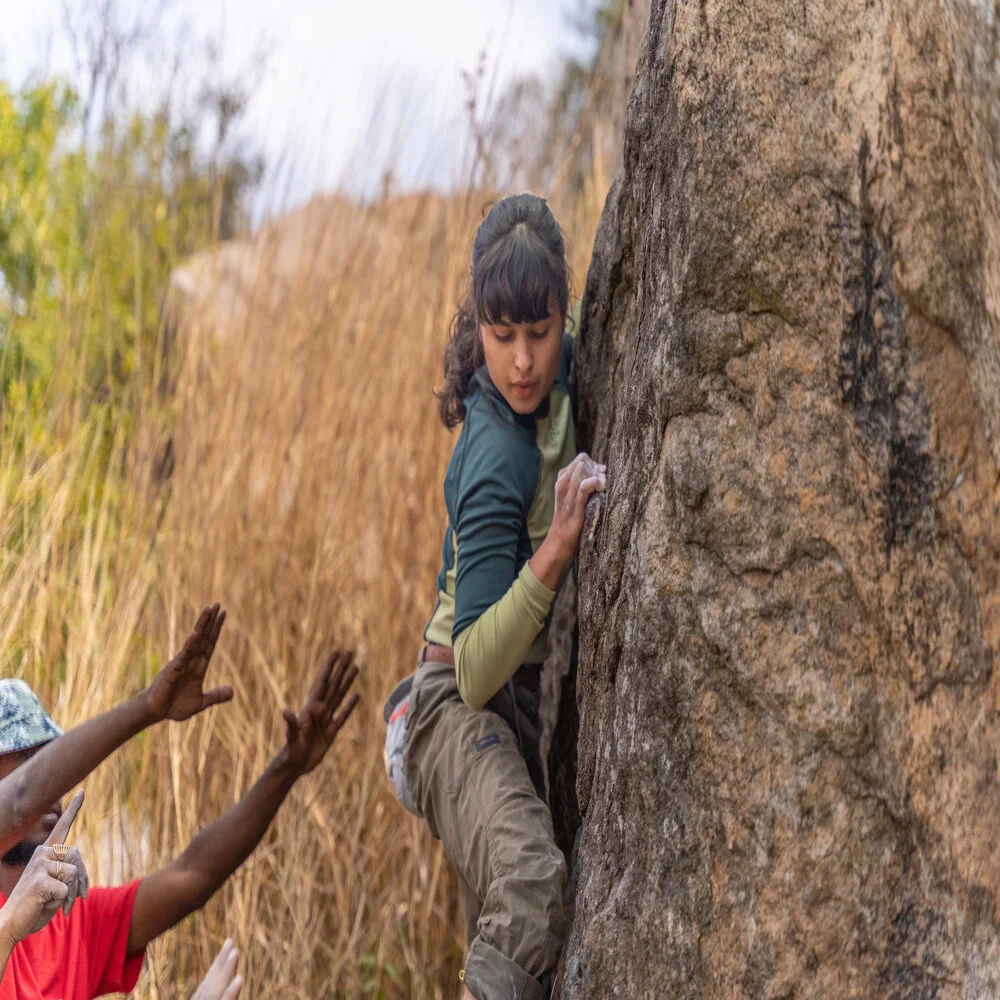
Ayushi, an Outdoor Leader, discovered her longing to be outdoors while exploring hikes during her college days.
My outdoor journey started while pursuing my graduation in Mumbai. A native of Jabua, Madhya Pradesh, Ayushi discovered her passion for hiking and venturing into the wilderness. As her fondness for hiking developed, she started exploring new hikes around Mumbai every month, except during summer.
Quitting MBA dream to embrace outdoors
Arushi recalls the ultimate epiphanic moment when she realised her true calling. After her graduation, while preparing for CAT she faced her hesitance to navigate the corporate world.
“Around this time, I read Black Swan by Nassim Nicholas Taleb, and it convinced me to work to earn enough so that I could be outdoors on weekends and vacations. I asked myself, where is the meaning then,” shares Arushi. Her quest for embracing the outdoors was realized during her first Himalayan trek. A trek to Kuari Pass cleared her thoughts and discovered career opportunities in the outdoors, something she was unaware of.
Gaining Outdoor Skills
“Since then, I have never looked back. I was so eager to explore the outdoors that I immediately enrolled for the Basic Mountaineering Course and applied at a trekking company for a trek leader’s job,” she adds. Her stint as a trek leader reaffirmed her love for the outdoors. To witness trekkers return with something concrete drives you to do better. Asyushi says she has witnessed drastic changes in trekkers’ approaches and attitudes when they complete the trek.
Ayushi is determined to explore more of the outdoors and has been upskilling herself through various courses. She has completed the Wilderness First Responder Course, Basic Rock Climbing Course, and Essentials of River Kayaking. She believes upskilling through courses helps her navigate more avenues in the industry.
Outdoors, still a male-dominated field?
Ayushi, who has led treks across the Himalayas, shares that she has witnessed and led teams that comprise more women trekkers than men.
A decade ago, trek leading was a male-dominated field. There has been a shift in the outdoor industry in recent years.
“Working in the outdoors is a physically demanding role. We, as women, lack to some extent, and it is taxing physically to be at par with men. But women bring a lot of other attributes to the table that enable us to stand together with men in the outdoors.
“Although physical strength is a priority when you are out in the wilderness, leading treks, the characteristics women possess are also extremely important. The caring and emphatic nature of women works wonders while motivating the trekkers who struggle on the trail,” observes Anagha.
She credits the increasing number of women in the outdoors to the financial independence women enjoy.
The ratio of our trekkers is almost equal. On some treks, we have more women than men. Outdoor is no longer a field ventured only by men. Although there are still certain constraints, more women have found a place, whether in outdoor leadership roles or as explorers and solo travellers.
Akansha, who has extensively hiked in Bhutan, Himachal, Uttarakhand, and now in North East India, shares that being a married woman and a solo hiker raises a lot of eyebrows.
“Unfortunately, in my age bracket, it’s fewer than the fewest. However, I have still been lucky to find women sharing similar interests, but yes, a very minuscule number. While the gender stereotypes are progressively changing for good hobbies like cycling long distances, hiking alone in the woods, or travelling solo is considered masculine and not very ladylike. I think it also has a lot to do with conditioning and women who are married seeking mutual agreement with their spouses on the same.”
Outdoor benefits you emotionally and physically
There has been ample research on the benefits of spending time outdoors. Being close to nature benefits the human mind, physically and emotionally.
“I have been a very restless and anxious person. I often find myself struggling with concentration and focus in an urban setting. Every time I am out in the wilderness, I experience an epiphanic moment. Being outdoors, in proximity to nature, has comforted me with clarity of thought, decisiveness, and overall quality of life,” says Anagha, who frequents the outdoors as an Outdoor Leader and Medical officer.
Anagha and Neha find the outdoors very meditative, where they can gather answers to doubts accumulated in their mind.
“I was a different person every time I returned from the outdoors. I could differentiate between my priorities. Above all, I was happy from within,” shares Anagha.
For Akansha, embracing the rawness of the outdoors has comforted her with immense solace and calmness. Her proximity to nature has made her more accepting of flaws within herself and others.
“In nature, nothing is perfect, yet everything is perfect. Trees can be contorted and bent in weird ways, and they’re still so beautiful,” she recalls the quote by Alice Walker and shares how the most profound lessons are found where you least expect them.
Her conscious choice of living a sustainable life is a result of her venturing outdoors and understanding the planet better. My journeys in the wilderness have helped me accept some substantial lifestyle changes. A year ago, I turned into a pure vegetarian, also putting a conscious ban on leather-based products. She expresses that her closeness to nature has helped her gain perspective, and now, she contemplates creating awareness of animal abuse and climate change through her outdoor explorations.
Ayushi, who has led treks in Himachal, Uttarakhand, and Kashmir, shares that her proximity to nature taught her mindfulness. She says it has helped her value her relationships better. “I’ve become better at managing my emotions, and my spiritual journey has also leapt because of my exposure to the outdoor world.
She attributes her enhanced innovativeness to spending time in nature. Aysuhi shared she began to write more after she started going outdoors.
“I could create better experiences for my trekkers, and I became better at my reflections, she shares. I have seen people drawing, dancing, singing, writing poetries in my groups! People have come up with business ideas on treks,” shares Arushi.
Outdoor Culture in India
According to Anagha, the outdoor culture is not yet fully ingrained in our country. She believes that the demanding and stressful work culture in India often limits people from exploring the outdoors, leading to a sedentary lifestyle.
“People who work five days a week and get a day or two off do not want to hike up a hill. Venturing outdoors is considered a rigorous task by people comfortable with weekend culture. On the weekend, working people wish to celebrate and party. This is one of the reasons why outdoor culture is not prevalent yet. It is long and arduous working hours that restrict people from exploring the outdoors and embracing outdoor culture,” she adds.
Anagha also believes when the general populace starts focusing on their physical health, the outdoor culture will start developing. However, she observes that there has been a shift in some places. Bangalore has a rich culture, though embraced by a select few.
Ayushi opines a lack of information about trekking restricts people from exploring hikes around their city. People don’t know many regional treks/hikes that offer them a good outdoor experience. Also, I feel outdoors are more about learning to be more self-sufficient, and learning backpacking skills rather than thinking of it as only recreation. Because when people learn that, they go outdoors more often. It becomes a little more accessible because otherwise, it’s still a luxury because of the cost involved. Ayushi strongly feels that there are very less Hindi movies that represent the true meaning of trekking. Screens have a great impact too.
Everyone must go out and embrace the outdoors
Going out and exploring the outdoors can be different for everyone. For some, hiking in the forest can bring solace while others find their muse while ascending a steep slope in the Himalayas. For many, going for nature walks, and witnessing wildlife in their natural habitat thrill them. There is a reasonable amount of outdoor activity.
Venturing outdoors and immersing yourself in nature have proven benefits for your physical and mental health.
Akanksha, who meets new tribes through her hikes, says, “Along with physical health, hiking also nourishes the soul and aids in self-realization, actuation, and holistic development and to be kind. Hiking makes us realize that this tiny planet of ours is meant to be shared by all, and we must do our bit to save what is left for the generations to come.”
Ayushi believes exploring the outdoors can prove transformational for people of all ages and genders. It is a great way to learn about new cultures, survival skills and most importantly, knowing yourself. People can find different meanings when they venture outdoors. They just need to go out once and find their meaning for themselves.
Are there career prospects for women in the outdoors?
There is no dearth of career opportunities for women in the outdoors. You can be a trek leader, explorer, naturalist, lead expeditions, or start your own venture, to name a few.
Ayushi shares that there are ample amount of opportunities for women who want to enter the outdoors professionally. They can be Outdoor leaders, or they can work in Adventure Therapy. They can be route setters, work at climbing gyms, can become trainers of adventure sports like water sports, aero sports, etc. They can be full-time athletes too.
If they are interested in management, they can head/assist the backend operations of treks after a few years of experience in the outdoors.
For Akanksha, hiking has been her calling. She believes commercializing it would take the charm out of it and become a mundane job.
She helps young novices free of charge to take the plunge into an outdoor way of life. Currently, she regards hiking and exploring as her hobby and passion and intends to continue doing so for the foreseeable future.
We would love to hear stories of more women exploring the different outdoor industries. Let us know in the comment section, or write to tamanna@gooutwithowls.com.

